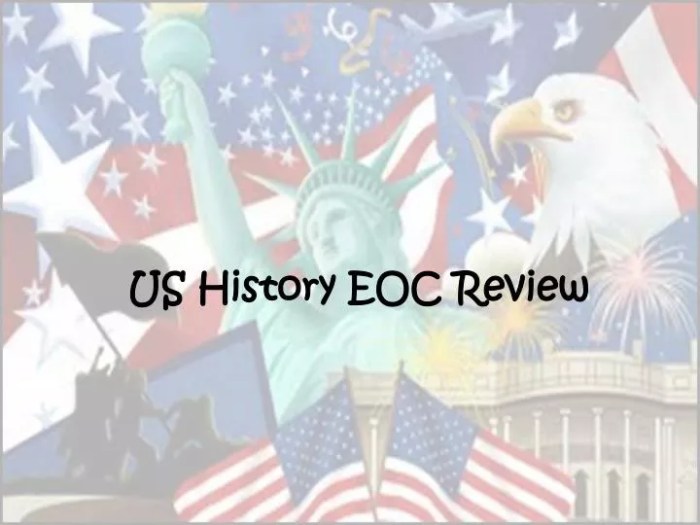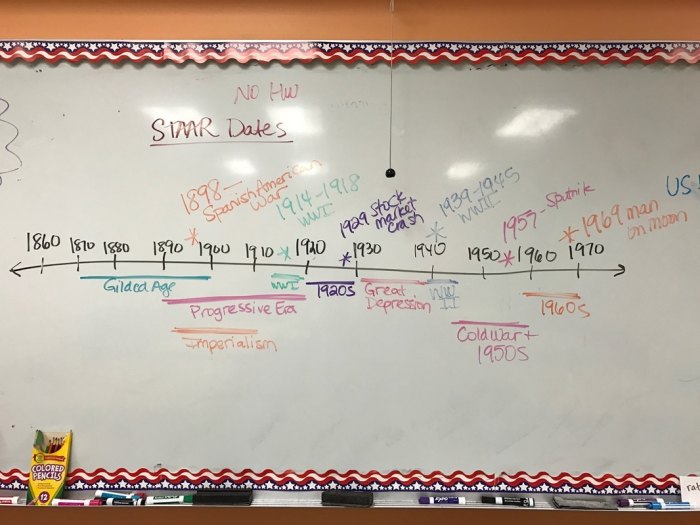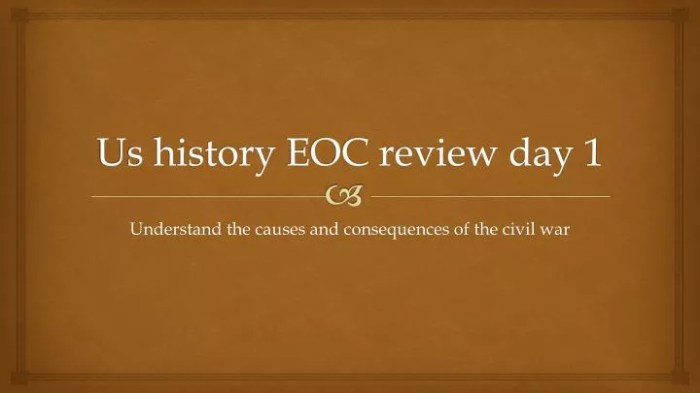Day 1 us history eoc review – Begin your journey into the captivating world of US history with our day 1 EOC review. This comprehensive guide will take you on an enthralling exploration of key events, influential figures, and transformative developments that have shaped the nation.
From the momentous Declaration of Independence to the groundbreaking Constitutional Convention, we will delve into the origins and foundations of the United States. Meet the visionary leaders who played pivotal roles, analyze pivotal documents that defined the nation’s course, and witness the social, economic, and political forces that have driven its growth and evolution.
Key Concepts and Events: Day 1 Us History Eoc Review

In the annals of American history, the Declaration of Independence stands as a beacon of liberty and self-determination. Its significance lies in its bold declaration of the inherent rights of individuals and the formation of a new nation founded upon the principles of freedom, equality, and self-governance.
The American Revolution
The American Revolution was a pivotal conflict that transformed the political landscape of the American colonies. Its causes can be traced to growing tensions between the colonies and the British government over issues of taxation, representation, and economic policies. The consequences of the Revolution were profound, leading to the establishment of an independent nation and the creation of a new democratic system of government.
The Constitutional Convention
In the aftermath of the American Revolution, the Constitutional Convention was convened to establish a framework for the new nation. Delegates from across the states gathered in Philadelphia to draft a document that would define the structure and powers of the federal government.
After reviewing the key concepts from day 1 of the US History EOC, I realized that I needed to take a break and explore something different. I stumbled upon an article about Beta Theta Pi at UT Austin , and it sparked my interest.
Their philanthropic efforts and commitment to brotherhood caught my attention. Refreshed and inspired, I returned to my day 1 US History EOC review with a renewed sense of purpose.
The Constitution, which emerged from this convention, has served as the bedrock of American democracy for over two centuries.
Important Figures and Documents

The founding of the United States of America was shaped by influential figures and groundbreaking documents that laid the foundation for the nation’s identity and governance. Among these, George Washington, Thomas Jefferson, and Benjamin Franklin stand out as pivotal figures, while the Mayflower Compact, the Articles of Confederation, and the Bill of Rights played crucial roles in establishing the principles and structures of the American government.
George Washington
- First President of the United States (1789-1797)
- Supreme Commander of the Continental Army during the American Revolutionary War
- Instrumental in the drafting and ratification of the Constitution
- Known as the “Father of His Country” for his leadership and unwavering dedication to the nation
Thomas Jefferson
- Principal author of the Declaration of Independence (1776)
- Third President of the United States (1801-1809)
- Advocate for individual liberty, states’ rights, and the expansion of the nation
- Purchased the Louisiana Territory from France, doubling the size of the United States
Benjamin Franklin
- Inventor, scientist, and diplomat
- Played a key role in drafting the Declaration of Independence and the Constitution
- Negotiated the Treaty of Paris (1783), which ended the American Revolutionary War
- Established the first public library and fire department in the United States
Mayflower Compact
The Mayflower Compact was an agreement signed by the Pilgrims who sailed on the Mayflower in 1620. It established a rudimentary form of government based on the consent of the governed, setting a precedent for democratic principles in America.
Articles of Confederation
The Articles of Confederation were the first constitution of the United States, adopted in 1781. They established a loose confederation of states with limited federal authority. However, the Articles proved ineffective, leading to the drafting of the Constitution.
Bill of Rights
The Bill of Rights, consisting of the first ten amendments to the Constitution, was adopted in 1791. It guarantees fundamental rights and freedoms, including freedom of speech, religion, and the right to bear arms. The Bill of Rights has had a profound impact on American history, shaping the nation’s legal system and protecting individual liberties.
Social and Economic Developments

The United States underwent significant social and economic transformations during its early history. These developments had a profound impact on the nation’s identity, culture, and economy.
Westward Expansion
The westward expansion was a defining characteristic of the 19th century in the United States. As settlers moved westward, they encountered new lands, cultures, and challenges. The expansion had a profound impact on the country’s political, economic, and social landscape.
- Economic Impact:Westward expansion provided new opportunities for economic growth and development. Settlers established farms, businesses, and industries in the new territories, contributing to the nation’s economic prosperity.
- Political Impact:The westward expansion led to the acquisition of new territories and the expansion of the United States’ borders. It also sparked debates over land ownership, Native American rights, and the balance of power between the federal government and the states.
- Social Impact:The westward expansion brought together people from diverse backgrounds and cultures. It led to the formation of new communities, the displacement of Native American tribes, and the rise of new social and cultural norms.
Growth of Slavery and the Abolitionist Movement, Day 1 us history eoc review
Slavery was a central issue in the United States during the 19th century. The institution of slavery had a profound impact on the nation’s economy, society, and politics.
- Economic Impact:Slavery was a major economic driver in the Southern United States. Slave labor was used extensively in agriculture, particularly in the production of cotton, tobacco, and sugar.
- Social Impact:Slavery created a rigid social hierarchy based on race. Slaves were denied basic rights and freedoms, and their lives were often marked by brutality and oppression.
- Political Impact:Slavery was a major source of tension between the North and the South. The issue of slavery led to debates over states’ rights, the balance of power between the federal government and the states, and the future of the Union.
Industrial Revolution
The Industrial Revolution was a period of rapid technological and economic change that began in the late 18th century. The Industrial Revolution had a profound impact on American society.
- Economic Impact:The Industrial Revolution led to the rise of factories, mass production, and the development of new industries. It transformed the United States from an agrarian economy to an industrial powerhouse.
- Social Impact:The Industrial Revolution brought about significant social changes. It led to the growth of cities, the rise of a middle class, and the emergence of new social problems such as poverty, inequality, and labor unrest.
- Technological Impact:The Industrial Revolution was driven by technological advancements such as the steam engine, the cotton gin, and the telegraph. These advancements revolutionized transportation, communication, and manufacturing.
Political and Cultural Changes

The United States has undergone significant political and cultural transformations throughout its history. The development of political parties, the impact of immigration, and the rise of mass media have all played crucial roles in shaping American society.
Development of Political Parties
The two-party system, consisting of the Democratic and Republican parties, emerged in the early 19th century. These parties have dominated American politics, providing a framework for political discourse and decision-making.
Impact of Immigration
Immigration has had a profound impact on American culture. Waves of immigrants from various backgrounds have brought their traditions, customs, and beliefs, contributing to the country’s rich diversity.
Rise of Mass Media
The rise of mass media, particularly in the 20th century, has transformed American society. Newspapers, radio, television, and the internet have become powerful forces in shaping public opinion, informing citizens, and influencing cultural trends.
Frequently Asked Questions
What is the significance of the Declaration of Independence?
The Declaration of Independence proclaimed the thirteen American colonies’ independence from British rule and established the United States as a sovereign nation.
Who were some of the key figures in the American Revolution?
George Washington, Thomas Jefferson, and Benjamin Franklin were instrumental in leading the American colonies to victory in the Revolutionary War.
What was the purpose of the Constitutional Convention?
The Constitutional Convention was held in 1787 to revise the Articles of Confederation and establish a new framework for the government of the United States.